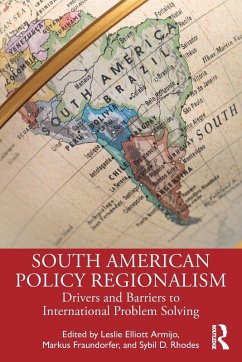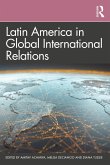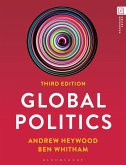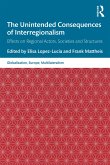South American Policy Regionalism
Drivers and Barriers to International Problem Solving
Herausgeber: Armijo, Leslie Elliott; Rhodes, Sybil D.; Fraundorfer, Markus
South American Policy Regionalism
Drivers and Barriers to International Problem Solving
Herausgeber: Armijo, Leslie Elliott; Rhodes, Sybil D.; Fraundorfer, Markus
- Broschiertes Buch
- Merkliste
- Auf die Merkliste
- Bewerten Bewerten
- Teilen
- Produkt teilen
- Produkterinnerung
- Produkterinnerung
Contrasting three schools of thought in international relations, South American Policy Regionalism introduces the idea of international policy regionalism as a framework for informed debate about international policy-sector interactions in a regional space, and demonstrates the relevancy of international relations theory.
Andere Kunden interessierten sich auch für
![Latin America in Global International Relations Latin America in Global International Relations]() Latin America in Global International Relations34,99 €
Latin America in Global International Relations34,99 €![Global Politics Global Politics]() Dr Ben WhithamGlobal Politics44,99 €
Dr Ben WhithamGlobal Politics44,99 €![Rethinking Post-Cold War Russian-Latin American Relations Rethinking Post-Cold War Russian-Latin American Relations]() Rethinking Post-Cold War Russian-Latin American Relations123,99 €
Rethinking Post-Cold War Russian-Latin American Relations123,99 €![The Unintended Consequences of Interregionalism The Unintended Consequences of Interregionalism]() The Unintended Consequences of Interregionalism59,99 €
The Unintended Consequences of Interregionalism59,99 €![Multilateralism Past, Present and Future Multilateralism Past, Present and Future]() Mario TelòMultilateralism Past, Present and Future34,99 €
Mario TelòMultilateralism Past, Present and Future34,99 €![Fifty Key Thinkers in International Relations Fifty Key Thinkers in International Relations]() Martin Griffiths (Flinders University, Adelaide, Australia)Fifty Key Thinkers in International Relations54,99 €
Martin Griffiths (Flinders University, Adelaide, Australia)Fifty Key Thinkers in International Relations54,99 €![Religion and World Politics Religion and World Politics]() Erin K. Wilson (the Netherlands University of Groningen)Religion and World Politics34,99 €
Erin K. Wilson (the Netherlands University of Groningen)Religion and World Politics34,99 €-
-
-
Contrasting three schools of thought in international relations, South American Policy Regionalism introduces the idea of international policy regionalism as a framework for informed debate about international policy-sector interactions in a regional space, and demonstrates the relevancy of international relations theory.
Hinweis: Dieser Artikel kann nur an eine deutsche Lieferadresse ausgeliefert werden.
Hinweis: Dieser Artikel kann nur an eine deutsche Lieferadresse ausgeliefert werden.
Produktdetails
- Produktdetails
- Verlag: Taylor & Francis Ltd
- Seitenzahl: 318
- Erscheinungstermin: 30. September 2024
- Englisch
- Abmessung: 228mm x 152mm x 23mm
- Gewicht: 498g
- ISBN-13: 9781032747194
- ISBN-10: 1032747196
- Artikelnr.: 70441175
- Herstellerkennzeichnung
- Libri GmbH
- Europaallee 1
- 36244 Bad Hersfeld
- 06621 890
- Verlag: Taylor & Francis Ltd
- Seitenzahl: 318
- Erscheinungstermin: 30. September 2024
- Englisch
- Abmessung: 228mm x 152mm x 23mm
- Gewicht: 498g
- ISBN-13: 9781032747194
- ISBN-10: 1032747196
- Artikelnr.: 70441175
- Herstellerkennzeichnung
- Libri GmbH
- Europaallee 1
- 36244 Bad Hersfeld
- 06621 890
Leslie Elliott Armijo holds research affiliations with Simon Fraser University (SIS) and Boston University (GDP Center) and has been a Visiting Scholar in Rio de Janeiro (PUC), New Delhi (CPR), Berlin (FUB), and São Paulo (USP). She is (co)author or editor of The BRICS and Collective Financial Statecraft (2018), Unexpected Outcomes: How Emerging Economies Survived the Global Financial Crisis (2015), The Financial Statecraft of Emerging Powers (2014), Debating the Global Financial Architecture (2002), Financial Globalization and Democracy in Emerging Markets (1999), and fifty odd articles or chapters on ethics, democracy, growth, and international politics in Latin America and India. Markus Fraundorfer is Associate Professor of Global Governance at the University of Leeds and the program director of the MA Global Governance & Diplomacy. He examines current transformation processes in global governance and previously researched Brazil's role in regional and global governance. He worked at the Universidade de Sã Paulo and was a visiting fellow at the Pontifíia Universidade Catóica do Rio de Janeiro (PUC-Rio) and the Universidade de Brasíia. His previous books include Brazil' Emerging Role in Global Governance: Health, Food Security and Bioenergy (2015), Rethinking Global Democracy in Brazil (2018), and Global Governance in the Age of the Anthropocene (2022). Sybil D. Rhodes directs the Department of Political and Juridical Sciences and the Foreign Policy Observatory at the Universidad del CEMA in Buenos Aires, Argentina. Her areas of expertise include the politics of international public policy and multilateral cooperation, particularly in the policy arenas of migration, citizenship and human rights, as well as infrastructure and consumer protection. She is the author of Social Movements and Free-Market Capitalism in Latin America (2006).
Foreword
Jorge Heine
Editor's Preface
Part 1. International Policy Regionalism: Why, How, and the Theoretical
Significance of Latin America
1. How Latin America Cooperates: A Brief Look at the Historical Record
Leslie Elliott Armijo, Markus Fraundorfer, and Sybil D. Rhodes
2. Theory: The International Relations of Regional Policy Cooperation
Leslie Elliott Armijo, Markus Fraundorfer, and Sybil D. Rhodes
3. Methods: Investigating International Policy Regionalism in the Global
South and Beyond
Leslie Elliott Armijo, Markus Fraundorfer, and Sybil D. Rhodes
Part 2. International Power Structures and Policy Sector Results
4. Illegal Drugs: How the Support of Prohibition Undermines Effective
Regional Solutions
Nicolas Alexander Beckmann
5. Infrastructure: Explaining the Divergent Experiences of Central and
South America
Giovanni Agostinis and Stefano Palestini
6. Long-Term Finance: The Challenging International Politics of Regional
Development Banks
Leslie Elliott Armijo and Verónica Rubio Vega Sepehr
Part 3. The Strength of Issue Arena Incentives
7. Energy: Interconnection without Integration
Klaus Guimarães Dalgaard and Felipe Mendes Cardoso
8. Immigration and Asylum: The Political Economy of Migration Governance in
South America since the Cold War
Sybil D. Rhodes
9. Climate Action: Splintered Multilateralism and Networked
Transnationalism
Amy Below
Part 4. When Norm Entrepreneurs Lead
10. Neglected Tropical Diseases: Health Governance at the Global-Regional
Nexus
Markus Fraundorfer
11. Food Policy: Examining the Influence of Brazilian Coalitions
Carolina Milhorance and Paulo Niederle
12. Artificial Intelligence: Latin America's Contested Norms
Glauco Arbix, João Paulo C. Veiga, Scott B. Martin
Part 5. Conclusions: Findings and Further Questions, Empirical and
Theoretical
13. Lessons from South American Policy Regionalism
Leslie Armijo, Markus Fraundorfer, and Sybil D. Rhodes
Jorge Heine
Editor's Preface
Part 1. International Policy Regionalism: Why, How, and the Theoretical
Significance of Latin America
1. How Latin America Cooperates: A Brief Look at the Historical Record
Leslie Elliott Armijo, Markus Fraundorfer, and Sybil D. Rhodes
2. Theory: The International Relations of Regional Policy Cooperation
Leslie Elliott Armijo, Markus Fraundorfer, and Sybil D. Rhodes
3. Methods: Investigating International Policy Regionalism in the Global
South and Beyond
Leslie Elliott Armijo, Markus Fraundorfer, and Sybil D. Rhodes
Part 2. International Power Structures and Policy Sector Results
4. Illegal Drugs: How the Support of Prohibition Undermines Effective
Regional Solutions
Nicolas Alexander Beckmann
5. Infrastructure: Explaining the Divergent Experiences of Central and
South America
Giovanni Agostinis and Stefano Palestini
6. Long-Term Finance: The Challenging International Politics of Regional
Development Banks
Leslie Elliott Armijo and Verónica Rubio Vega Sepehr
Part 3. The Strength of Issue Arena Incentives
7. Energy: Interconnection without Integration
Klaus Guimarães Dalgaard and Felipe Mendes Cardoso
8. Immigration and Asylum: The Political Economy of Migration Governance in
South America since the Cold War
Sybil D. Rhodes
9. Climate Action: Splintered Multilateralism and Networked
Transnationalism
Amy Below
Part 4. When Norm Entrepreneurs Lead
10. Neglected Tropical Diseases: Health Governance at the Global-Regional
Nexus
Markus Fraundorfer
11. Food Policy: Examining the Influence of Brazilian Coalitions
Carolina Milhorance and Paulo Niederle
12. Artificial Intelligence: Latin America's Contested Norms
Glauco Arbix, João Paulo C. Veiga, Scott B. Martin
Part 5. Conclusions: Findings and Further Questions, Empirical and
Theoretical
13. Lessons from South American Policy Regionalism
Leslie Armijo, Markus Fraundorfer, and Sybil D. Rhodes
Foreword
Jorge Heine
Editor's Preface
Part 1. International Policy Regionalism: Why, How, and the Theoretical
Significance of Latin America
1. How Latin America Cooperates: A Brief Look at the Historical Record
Leslie Elliott Armijo, Markus Fraundorfer, and Sybil D. Rhodes
2. Theory: The International Relations of Regional Policy Cooperation
Leslie Elliott Armijo, Markus Fraundorfer, and Sybil D. Rhodes
3. Methods: Investigating International Policy Regionalism in the Global
South and Beyond
Leslie Elliott Armijo, Markus Fraundorfer, and Sybil D. Rhodes
Part 2. International Power Structures and Policy Sector Results
4. Illegal Drugs: How the Support of Prohibition Undermines Effective
Regional Solutions
Nicolas Alexander Beckmann
5. Infrastructure: Explaining the Divergent Experiences of Central and
South America
Giovanni Agostinis and Stefano Palestini
6. Long-Term Finance: The Challenging International Politics of Regional
Development Banks
Leslie Elliott Armijo and Verónica Rubio Vega Sepehr
Part 3. The Strength of Issue Arena Incentives
7. Energy: Interconnection without Integration
Klaus Guimarães Dalgaard and Felipe Mendes Cardoso
8. Immigration and Asylum: The Political Economy of Migration Governance in
South America since the Cold War
Sybil D. Rhodes
9. Climate Action: Splintered Multilateralism and Networked
Transnationalism
Amy Below
Part 4. When Norm Entrepreneurs Lead
10. Neglected Tropical Diseases: Health Governance at the Global-Regional
Nexus
Markus Fraundorfer
11. Food Policy: Examining the Influence of Brazilian Coalitions
Carolina Milhorance and Paulo Niederle
12. Artificial Intelligence: Latin America's Contested Norms
Glauco Arbix, João Paulo C. Veiga, Scott B. Martin
Part 5. Conclusions: Findings and Further Questions, Empirical and
Theoretical
13. Lessons from South American Policy Regionalism
Leslie Armijo, Markus Fraundorfer, and Sybil D. Rhodes
Jorge Heine
Editor's Preface
Part 1. International Policy Regionalism: Why, How, and the Theoretical
Significance of Latin America
1. How Latin America Cooperates: A Brief Look at the Historical Record
Leslie Elliott Armijo, Markus Fraundorfer, and Sybil D. Rhodes
2. Theory: The International Relations of Regional Policy Cooperation
Leslie Elliott Armijo, Markus Fraundorfer, and Sybil D. Rhodes
3. Methods: Investigating International Policy Regionalism in the Global
South and Beyond
Leslie Elliott Armijo, Markus Fraundorfer, and Sybil D. Rhodes
Part 2. International Power Structures and Policy Sector Results
4. Illegal Drugs: How the Support of Prohibition Undermines Effective
Regional Solutions
Nicolas Alexander Beckmann
5. Infrastructure: Explaining the Divergent Experiences of Central and
South America
Giovanni Agostinis and Stefano Palestini
6. Long-Term Finance: The Challenging International Politics of Regional
Development Banks
Leslie Elliott Armijo and Verónica Rubio Vega Sepehr
Part 3. The Strength of Issue Arena Incentives
7. Energy: Interconnection without Integration
Klaus Guimarães Dalgaard and Felipe Mendes Cardoso
8. Immigration and Asylum: The Political Economy of Migration Governance in
South America since the Cold War
Sybil D. Rhodes
9. Climate Action: Splintered Multilateralism and Networked
Transnationalism
Amy Below
Part 4. When Norm Entrepreneurs Lead
10. Neglected Tropical Diseases: Health Governance at the Global-Regional
Nexus
Markus Fraundorfer
11. Food Policy: Examining the Influence of Brazilian Coalitions
Carolina Milhorance and Paulo Niederle
12. Artificial Intelligence: Latin America's Contested Norms
Glauco Arbix, João Paulo C. Veiga, Scott B. Martin
Part 5. Conclusions: Findings and Further Questions, Empirical and
Theoretical
13. Lessons from South American Policy Regionalism
Leslie Armijo, Markus Fraundorfer, and Sybil D. Rhodes








